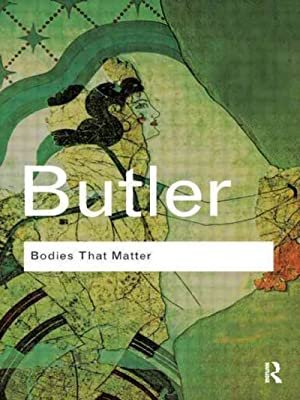Judith butler
(sucks now, but used to believe sex was real, so it’s fun to find evidence of that in these books)
Gender Trouble: Feminism and the Subversion of Identity (1990)
“This utopian notion of a sexuality freed from heterosexual constructs, a sexuality beyond ‘sex,’ failed to acknowledge the ways in which power relations continue to construct sexuality for women even within the terms of a ‘liberated’ sexuality or lesbianism.” (40)
“Within lesbian contexts, the ‘identification’ with masculinity that appears as butch identity is not a simple assimilation of lesbianism back into the terms of heterosexuality. As one lesbian femme explained, she likes her boys to be girls, meaning that ‘being a girl’ contextualizes and resignifies ‘masculinity’ in a butch identity. As a result, that masculinity, if that it can be called, is always brought into relief against a culturally intelligible ‘female body.’ It is precisely this dissonant juxtaposition and the sexual tension that its transgression generates that constitute the object of desire. In other words, the object [and clearly, there is not just one] of lesbian-femme desire is neither some decontextualized female body nor a discrete yet superimposed masculine identity, but the destabilization of both terms as they come into erotic interplay. Similarly, some heterosexual or bisexual women may well prefer that the relation of ‘figure’ to ‘ground’ work in the opposite direction — that is, they may prefer that their girls be boys. In that case, the perception of ‘feminine’ identity would be juxtaposed on the ‘male body’ as ground, but both terms would, through the juxtaposition, lose their internal stability and distinctness from each other. Clearly, this way of thinking about gendered exchanges of desire admits of much greater complexity, for the play of masculine and feminine, as well as the inversion of ground to figure can constitute a highly complex and structured production of desire. Significantly, both the sexed body as ‘ground’ and the butch or femme identity as ‘figure’ can shift, invert, and create erotic havoc of various sorts. Neither can lay claim to ‘the real,’ although either can qualify as an object of belief, depending on the dynamic of the sexual exchange.” (167)
“Interview with Judith Butler,” Sara Ahmed, Sexualities journal (2016)
“What if we shift the question from ‘who do I want to be?’ to the question, ‘what kind of life do I want to live with others?’? It seems to me that then many of the questions you pose about happiness, but perhaps also about ‘the good life’ – very ancient yet urgent philosophical questions – take shape in a new way. If the I who wants this name or seeks to live a certain kind of life is bound up with a ‘you’ and a ‘they’ then we are already involved in a social struggle when we ask how best any of us are to live.” (491)
“Variations on Sex and Gender: Beauvoir, Wittig, Foucault” (1987)
“Because the category of ‘sex’ only makes sense in terms of a binary discourse on sex in which “men” and “women” exhaust the possibilities of sex, and relate to each other as complementary opposites, the category of ‘sex’ is always subsumed under the discourse on heterosexuality. Hence, Wittig argues that a lesbian is not a woman, because to be a woman means to be set in a binary relation with a man. Wittig does not argue that the lesbian is another sex or gender, but claims that the lesbian “is the only concept I know which is beyond the category of sex.”13 But even as Wittig describes the lesbian in relation to this binary opposition of “man” and “woman,” she underscores the fact that this being beyond the opposition is still a way of being related to that opposition, indeed a binary relation at that. In order that the lesbian avoid being caught up in another binary opposition, i.e. the opposition to heterosexuality itself, “being lesbian” must itself become a multiple cultural phenomenon, a gender with no univocal essence. If binary oppositions imply hierarchies, then postulating a sexual identity “beyond” culture promises to set up yet another pair of oppositions which, in turn, suggest another hierarchical arrangement; hegemonic heterosexual culture will stand as the “Other” to that post-cultural subject, and a new model of hierarchy, positing the superiority of that subject, may well replace the old — at least on a theoretical level. Moreover, to define culture as necessarily preoccupied with the reproduction of binary oppositions is to support a structuralist assumption which seems neither valid nor politically beneficial. After all, if binary restrictions are to be overcome in experience, they must meet their dissolution in the creation of new cultural forms. As Beauvoir says, and Wittig should know, there is no meaningful reference to a “human reality” outside of the terms of culture. The political program for overcoming binary restrictions ought to be concerned, then, with cultural innovation rather than myths of transcendence.” (513)
Bodies that Matter: On the Discursive Limits of “Sex” (1996)
“But if there is no subject who decides on its gender, and if, on the contrary, gender is part of what decides the subject, how might one formulate a project that preserves gender practices as sites of critical agency? If gender is constructed through relations of power and, specifically, normative constraints that not only produce but also regulate various bodily beings, how might agency be derived from this notion of gender as the effect of productive constraint?” (x)


